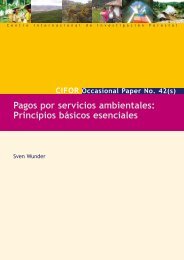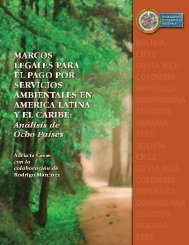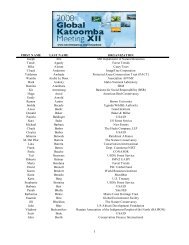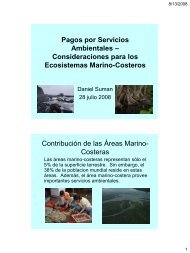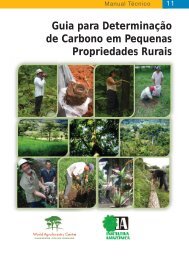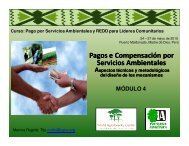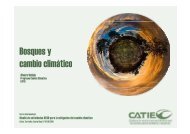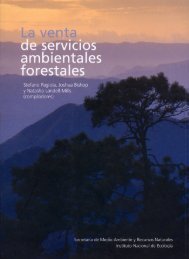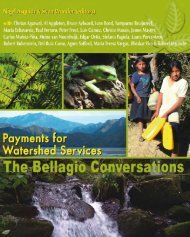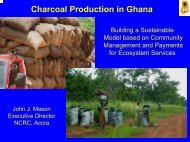Guide on Climate Change and Indigenous Peoples
Guide on Climate Change and Indigenous Peoples
Guide on Climate Change and Indigenous Peoples
- No tags were found...
You also want an ePaper? Increase the reach of your titles
YUMPU automatically turns print PDFs into web optimized ePapers that Google loves.
5What is the situati<strong>on</strong> in relati<strong>on</strong> toindigenous peoples, forests <strong>and</strong> REDD?• <strong>Indigenous</strong> peoples who live in <strong>and</strong> depend <strong>on</strong> forests have developed<strong>and</strong> sustained an intricate relati<strong>on</strong>ship with forests <strong>and</strong> thus they viewthe forest in a more wholistic way. For them, talking of forests <strong>on</strong>ly interms of carb<strong>on</strong> or emissi<strong>on</strong>s reducti<strong>on</strong> does not make sense. This viewwas reiterated in the “Hague Declarati<strong>on</strong> of the Internati<strong>on</strong>al <strong>Indigenous</strong>Forum <strong>on</strong> <strong>Climate</strong> <strong>Change</strong>” 4 in November 2000 during COP6.Hague Declarati<strong>on</strong> of the Internati<strong>on</strong>al<strong>Indigenous</strong> Forum <strong>on</strong> CLimate <strong>Change</strong>• Earth is our Mother. Our special relati<strong>on</strong>ship with Earth as stewards, asholders of indigenous knowledge cannot be set aside. Our special relati<strong>on</strong>shipwith her has allowed us to develop for millenia a particular knowledge of theenvir<strong>on</strong>ment that is the foundati<strong>on</strong> of our lifestyles, instituti<strong>on</strong>s, spirituality<strong>and</strong> world view. Therefore, in our philosophies, the Earth is not a commodity,but a sacred space that the Creator has entrusted to us to care for her, thishome where all beings live. (Secti<strong>on</strong> 11: C<strong>on</strong>siderati<strong>on</strong>s; Paragraph 1)• We reject the inclusi<strong>on</strong> of carb<strong>on</strong> sinks within the CDM <strong>and</strong> disagree with thedefiniti<strong>on</strong> of carb<strong>on</strong> sinks as stated in the Kyoto Protocol. We, as <strong>Indigenous</strong><strong>Peoples</strong>, manage the “natural carb<strong>on</strong> sinks” in our territories according to ourworld view <strong>and</strong> their integral use is a right that our people have an exerciseaccording to our local <strong>and</strong> specific needs. We do not accept that forests arevalued <strong>on</strong>ly for their carb<strong>on</strong> sequestrati<strong>on</strong> activity. (Secti<strong>on</strong> 11, paragraph 10)• A significant part of the remaining tropical <strong>and</strong> sub-tropical forests arefound in indigenous peoples’ territories.• C<strong>on</strong>flicting claims over ownership, governance, c<strong>on</strong>trol, use <strong>and</strong> accessto forests still persist in manytropical countries. Some of theseend up in courts or in violentarmed c<strong>on</strong>flicts. Generally, tropicalforest countries have low forestgovernance capacities.• Many indigenous peoples claimthat they have not experiencednor seen satisfactory experiences,mechanisms <strong>and</strong> arrangementsat the nati<strong>on</strong>al level - nor at theregi<strong>on</strong>al <strong>and</strong> global levels - <strong>on</strong>Role of Forest for<strong>Indigenous</strong> <strong>Peoples</strong>habitatsource of livelihoodprovides ecosystems servicessource of health servicescultural <strong>and</strong> spiritual functi<strong>on</strong>sPART V: REDD/REDD+ <strong>and</strong> <strong>Indigenous</strong> <strong>Peoples</strong> 55



